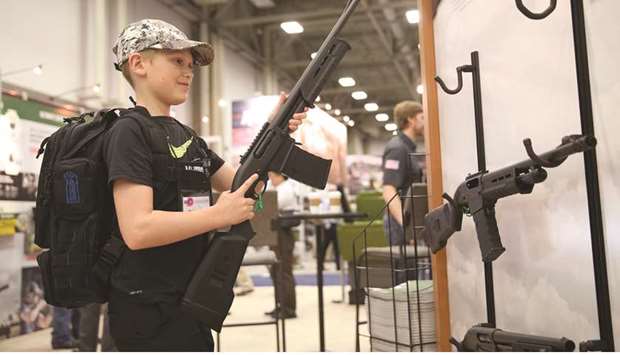US President Donald Trump was in Dallas yesterday to address the National Rifle Association (NRA)’s annual meeting, the powerful lobby’s first since the Parkland high school massacre sparked a grassroots campaign for gun control.
The president’s decision to go before the NRA so soon after the February 14 rampage in Florida signals a political shift as his Republicans head into sharply contested mid-term elections.
Public demands for stricter gun control measures soared after 17 people were shot dead in Parkland, with students mobilising hundreds of thousands of people in Washington March 24 for a mass display of outrage.
However, so far, the US Congress has taken little action and polls indicate public sentiment in favour of stricter gun laws is cooling, as it has after previous mass shootings.
“As we have indicated on many occasions, safety is a big priority, security is a big priority for the administration,” White House Press Secretary Sarah Sanders said this week when asked if it was “insensitive” of the president to go to the NRA meeting. “But we also support the Second Amendment and strongly support it, and don’t see there to be a problem with speaking at the National Rifle Association’s meeting.”
The four-day gathering in Dallas brings together hundreds of exhibitors as well as special events for NRA members like the “Leadership Forum” that Trump is scheduled to address.
With more than 5mn members, the NRA is long established as a feared political force in the United States and a fierce defender of the constitutional right to bear arms.
This will be the fourth time Trump has addressed the NRA convention.
Vice-President Mike Pence spoke at the gathering.
After the Parkland shootings, Trump said he was open to stronger gun control measures but has opposed a ban on assault rifles, a key demand of the student protesters.
Trump has instead proposed a ban on “bump stocks”, devices used to convert semi-automatic weapons into automatic-like weapons by accelerating their rate of fire.
Bump stocks were used by the gunman who mowed down 58 people at a country music concert in Las Vegas in October, the deadliest such attack in modern US history.
The US president also has sided with the student protesters in calling for raising the minimum age for gun purchases from 18 to 21, a position that the NRA opposes.
Controversially, though, Trump also advocates arming teachers as a first line of defence against school shooters, echoing the NRA’s claim that “the best way to stop a bad guy with a gun is good guy with a gun”.
The organisation exerts out-sized influence in Congress and state legislatures by financing the campaigns of supporters and targeting opponents.
After the Parkland massacre, the outpouring of emotion indicated that the political environment might be changing, putting the NRA on the defensive.
A Gallup poll in early March found that some 67% of Americans believed gun laws should be stricter, a 15-year high in the firm’s surveys.
But by mid-April a Marist poll found that the percentage of people for whom gun policy will heavily influence their vote in November had fallen to 46% from 59% in February.

Blaise Maliskey, age 11, tries out a firearm in an exhibit hall at the NRA’s annual convention in Dallas.
